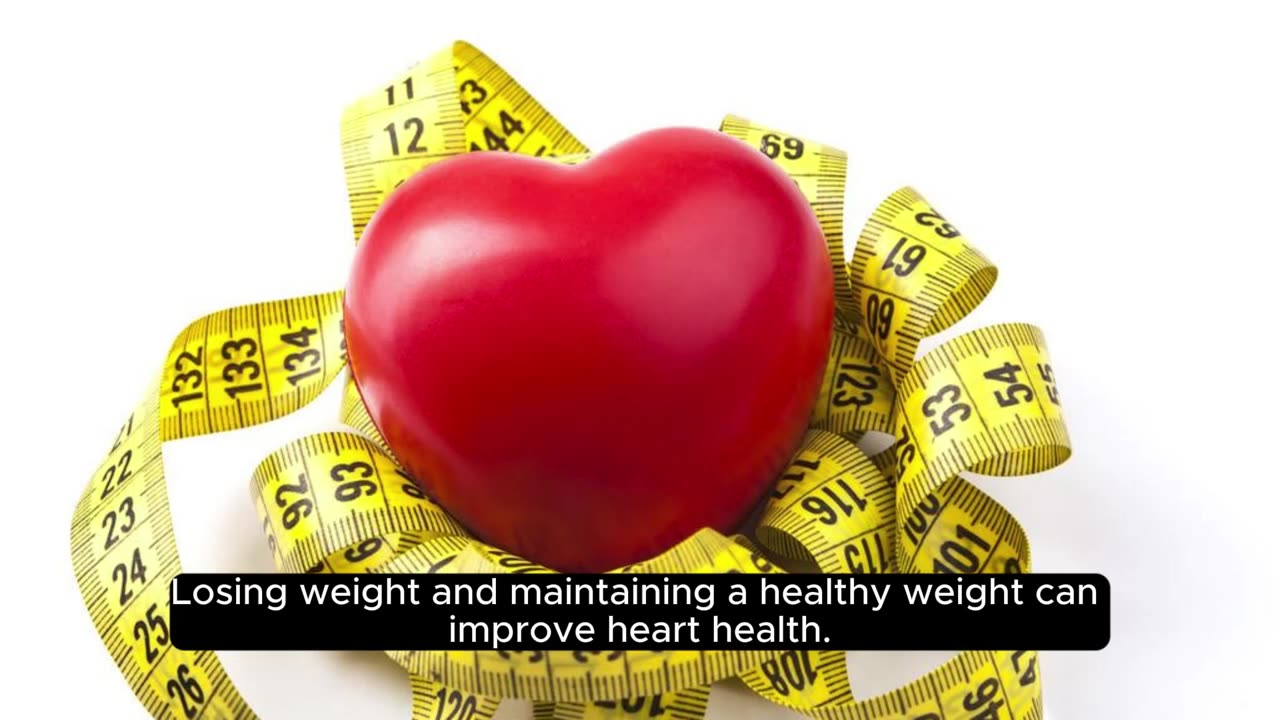Premium Only Content

12 Steps to Optimal Heart Health
12 Steps to Optimal Heart Health
Prioritizing heart health is a fundamental investment in your overall well-being. Adopting a heart-healthy lifestyle involves incorporating positive habits that support cardiovascular health. Here are 12 steps to guide you on the path to optimal heart health:
1. **Nourish with Nutrient-Rich Foods**: Embrace a diet rich in fruits, vegetables, whole grains, lean proteins, and healthy fats. These nutrient-dense foods provide essential vitamins, minerals, and antioxidants that promote heart health.
2. **Mindful Portion Control**: Be conscious of portion sizes to maintain a healthy weight and prevent overeating. Balancing your caloric intake with physical activity contributes to optimal heart health.
3. **Prioritize Physical Activity**: Engage in regular physical activity, such as brisk walking, jogging, swimming, or cycling. Aim for at least 150 minutes of moderate-intensity exercise per week to strengthen your heart and improve overall cardiovascular fitness.
4. **Maintain a Healthy Weight**: Achieving and maintaining a healthy weight is crucial for heart health. Strive for a body mass index (BMI) within the recommended range and focus on sustainable lifestyle changes.
5. **Manage Blood Pressure**: Keep your blood pressure within a healthy range by adopting a low-sodium diet, maintaining a healthy weight, and incorporating regular exercise. Regular monitoring and, if necessary, medication adherence are essential.
6. **Control Cholesterol Levels**: Monitor and manage cholesterol levels by reducing saturated and trans fats in your diet. Incorporate heart-healthy fats like omega-3 fatty acids, found in fish and nuts, to promote optimal cholesterol levels.
7. **Quit Smoking**: If you smoke, quitting is one of the most significant steps you can take for heart health. Smoking damages blood vessels and contributes to the development of heart disease. Seek support to quit and enjoy the benefits of a healthier heart.
8. **Limit Alcohol Intake**: While moderate alcohol consumption may have cardiovascular benefits, excessive drinking can lead to heart problems. If you choose to drink, do so in moderation, and be mindful of its impact on your overall health.
9. **Manage Stress**: Chronic stress can negatively affect heart health. Incorporate stress-reducing activities such as mindfulness, meditation, or hobbies to promote emotional well-being and mitigate the impact of stress on your heart.
10. **Get Quality Sleep**: Prioritize sufficient and restful sleep. Aim for 7-9 hours of sleep per night to support overall health, including heart health. Establishing a consistent sleep routine can contribute to better cardiovascular well-being.
11. **Stay Hydrated**: Drinking an adequate amount of water is essential for cardiovascular health. Proper hydration supports blood circulation, helps maintain electrolyte balance, and contributes to overall heart function.
12. **Regular Health Check-ups**: Schedule regular check-ups with your healthcare provider to monitor your heart health. Regular screenings for blood pressure, cholesterol, and other cardiovascular risk factors can help detect and address issues early.
By integrating these 12 steps into your lifestyle, you can foster optimal heart health and reduce the risk of cardiovascular diseases. Remember, small, consistent changes can lead to significant improvements in your heart health and contribute to a longer, healthier life.
-
 LIVE
LIVE
BigDaddySlick78's Live Gaming Channel
2 hours ago🔴 Call Of Duty Warzone Rebirth Island & Area 99 Live w/ Subs #callofduty #warzone #bo6 #cod
127 watching -
 49:41
49:41
BonginoReport
13 hours agoKristi Noem Honors Angel Mom After Son's Brutal Murder - Nightly Scroll w/Hayley Caronia (Ep.23)
155K73 -
 45:22
45:22
Stephen Gardner
11 hours ago🔥WTF! Dan Bongino’s CRYPTIC ARREST message!
124K119 -
 1:30:16
1:30:16
2 MIKES LIVE
13 hours ago2 MIKES LIVE #203 Lone Survivor with Donna Axelson and Adam Flynn!
75.1K -
 1:18:49
1:18:49
Kim Iversen
14 hours agoEXPOSED: Inside Tim Pool’s Secret Meeting with Netanyahu | Trump’s Tariff Gamble: Boost for America or Death Blow?
205K486 -
 5:28:29
5:28:29
Biscotti-B23
14 hours ago $5.35 earned🔴 LIVE GETSUGA GAUNTLET 🔥 TRAINING FOR RANKED ⚔ BLEACH REBIRTH OF SOULS
74.8K1 -
 1:19:00
1:19:00
Sarah Westall
11 hours agoMassive Spiral Structures Found Under Giza Pyramids, Advanced Ancient Societies w/ Jay Anderson
150K25 -
 54:32
54:32
LFA TV
18 hours agoStrongman Stare Down | TRUMPET DAILY 4.9.25 7PM
107K16 -
 1:35:31
1:35:31
Redacted News
14 hours agoBioweapons over America? U.S. Geo-engineering caught raining mysterious objects over U.S. | Redacted
231K360 -
 1:19:20
1:19:20
vivafrei
16 hours agoCanadian Government & Courts Denying Military Jab Injury Compensation? Trump Pronouns "No Thanks"?
147K41